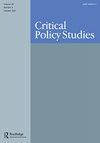Comparisons, Categories, and Labels: Investigating the North–South Dichotomy in Europe
IF 2.4
3区 社会学
Q1 Social Sciences
引用次数: 0
Abstract
ABSTRACT The paper presents genealogy-oriented analysis of how the Nordic model gained its dominant characterization as modern, advanced and superior to other European welfare models while Southern European countries came to be labelled laggards in the welfare domain. To illuminate the relational nature of these, and all, comparisons, the analysis accentuates how researchers, politicians, and civil servants alike designate Nordic and Southern European states, their societies, and their welfare models. The empirical analysis focuses on scholarly writings about welfare-state comparisons (1986–2017) and on European Union documents addressing cohesion policies (1986–2021). Analysis of the vocabulary and labelling illuminates how the Scandocentric and the South-related bias have been produced and reproduced.The analysis indicates that labels, once established, tend to get replicated without question and grow unquestionable in science and policy-making both. While reducing complexity and increasing predictability, this process simultaneously constrains alternative ways to interpret changing situations and alternative contexts.-比较、分类和标签:调查欧洲的南北二分法
摘要本文以谱系学为导向,分析了北欧模式是如何获得现代、先进和优于其他欧洲福利模式的主导特征的,而南欧国家在福利领域却被贴上了落后的标签。为了阐明这些以及所有比较的关系性质,该分析强调了研究人员、政治家和公务员如何指定北欧和南欧国家、其社会和福利模式。实证分析的重点是关于福利国家比较的学术著作(1986–2017)和欧盟关于凝聚力政策的文件(1986–2021)。对词汇和标签的分析阐明了斯堪的纳维亚中心主义和南方相关偏见是如何产生和再现的。分析表明,标签一旦建立,就会毫无疑问地被复制,并在科学和政策制定中变得毫无疑问。在降低复杂性和提高可预测性的同时,这一过程同时限制了解释不断变化的情况和替代背景的替代方式-
本文章由计算机程序翻译,如有差异,请以英文原文为准。
求助全文
约1分钟内获得全文
求助全文

 求助内容:
求助内容: 应助结果提醒方式:
应助结果提醒方式:


